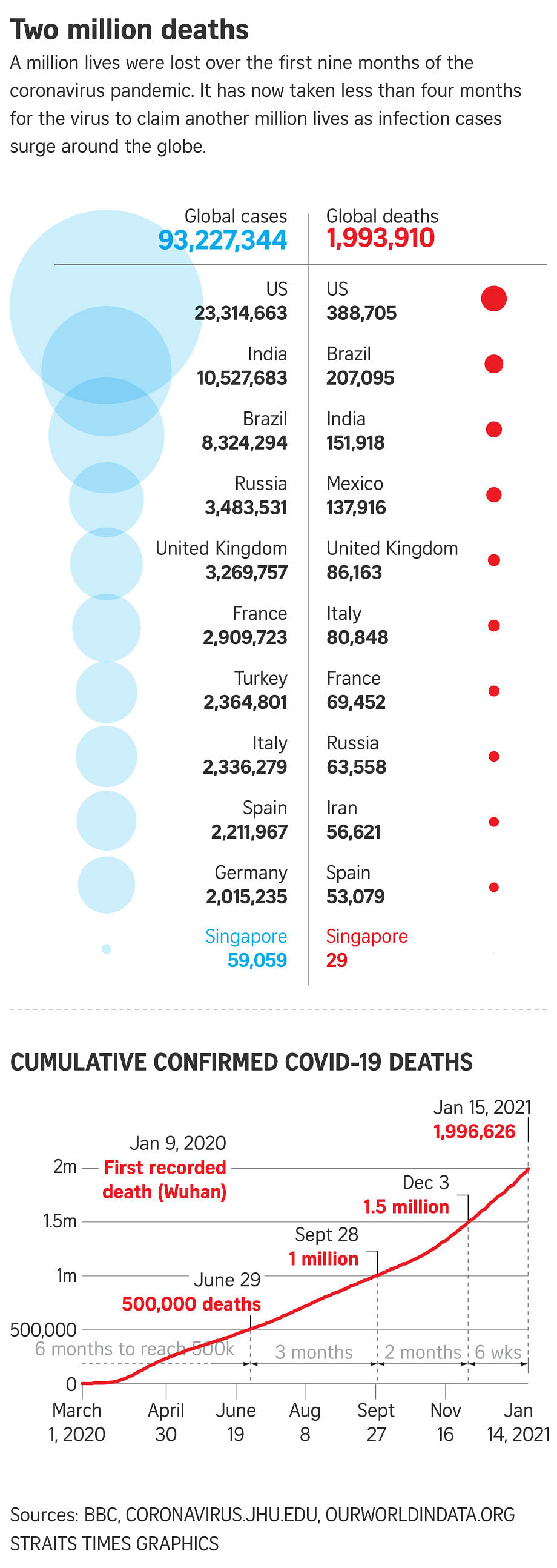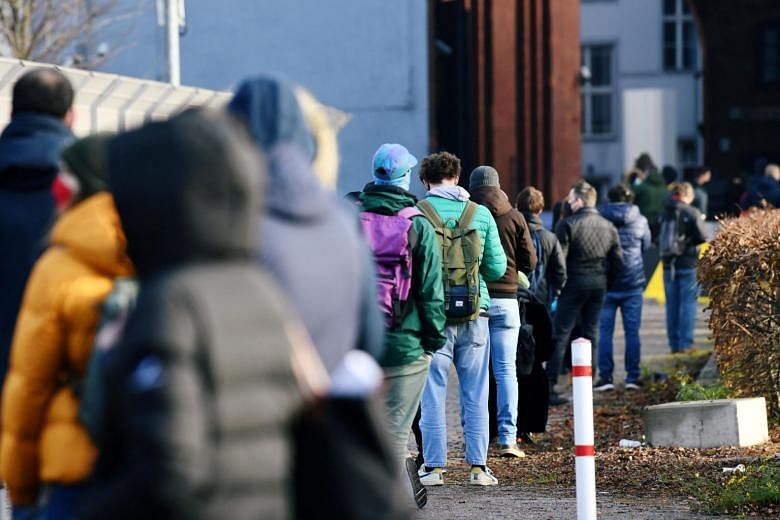FRANKFURT • Germany passed two million Covid-19 cases yesterday as a World Health Organisation (WHO) emergency committee readied to issue advice on stemming the spread of new, more contagious strains of the coronavirus.
Germany's Covid-19 cases rose by 22,368 to more than two million, according to the Robert Koch Institute for infectious diseases. It was the smallest rise in infections on a Friday for more than two months.
A week ago, the number of new cases registered was almost 10,000 higher.
But a high death toll, up 1,113 to 44,994 yesterday, and worries over more contagious variants of the coronavirus are fanning fears that existing lockdown measures are falling short.
The surge in Europe's biggest economy came as countries on the continent again tightened restrictions, with Portugal entering a fresh lockdown and Britain requiring negative tests for entry.
Despite the roll-out of vaccines - India's mammoth programme will begin today - many nations are doubling down on efforts to stall a pandemic that has now claimed almost two million lives.
Fresh curbs on populations were announced from Brazil to Lebanon, and Mexico has been hit with its deadliest week of the pandemic yet.
German Chancellor Angela Merkel on Thursday pushed for a "significant" tightening of curbs to slow the infection rate. She said she wanted to bring forward crisis talks with regional leaders to the coming week, participants at a meeting of her centre-right Christian Democratic Union party told Agence France-Presse.
They quoted her as saying the virus could be stopped only with "significant additional measures" and people urgently needed to reduce social contact.
Germany aims for its measures to bring the number of infections per 100,000 inhabitants over seven days down to no more than 50. That number currently stands at around 150.
At the Meissen crematorium in the state of Saxony, coffins were stacked up to three high or even stored in hallways awaiting cremation. The eastern region has been one of Germany's worst-hit areas in recent weeks.
Manager Joerg Schaldach, 57, said anyone still denying the severity of the pandemic should come and take a look at the bodies piling up. "This is heavy work, so why don't the Covid-19 deniers come and do it?" he said. "We have a disastrous situation here."
Still, Germany has fared better than many of its European neighbours in the pandemic, with France, Italy, Spain and Britain all recording more infections despite smaller populations.
Britain has started banning all arrivals from South American countries since yesterday over fears of importing a new coronavirus strain. "I've taken the urgent decision... following evidence of a new variant in Brazil," Transport Secretary Grant Shapps said on Twitter.
The new strain, known as E484K, has raised alarm among researchers over its possible impact on immunity.
Starting yesterday, London required all arrivals to show evidence of a clean coronavirus test taken in the last 72 hours to gain entry to Britain.
Global health experts were expected to issue recommendations to stem the spread of this variant and other new strains, which the WHO called "worrying".
The WHO's emergency committee normally gathers every three months but its meeting was brought forward by two weeks.
"When you first met almost a year ago, just 557 cases of the disease we now call Covid-19 had been reported to the WHO," director-general Tedros Adhanom Ghebreyesus said in his opening remarks to the emergency meeting on Thursday.
Scientists say large-scale vaccination is the only way out of the crisis but 95 per cent of the doses so far administered have been limited to just 10 countries, the WHO's European branch said.
Progress on administering vaccines has often been slow, such as in the United States, where around 10 million people have received a first shot, even as 4,000 people die from the virus every day.
AGENCE FRANCE-PRESSE, REUTERS


